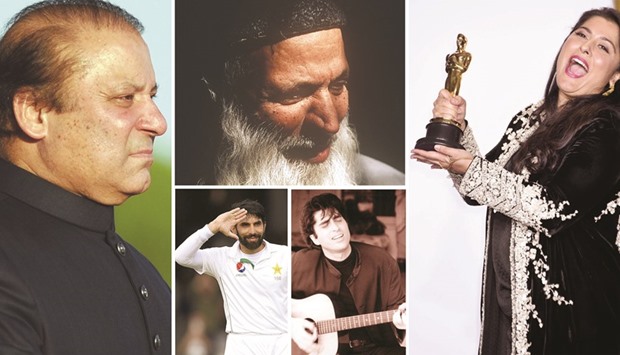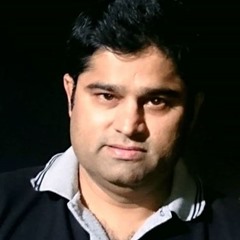It’s that time of the year. Stock-taking of this nature, of course, is no mean task and there will always be a difference of opinion depending on how people evaluate who. But here’s a very short A-list Pakistani pack, which, like or loathe, will be hard for anyone to ignore in terms of the sheer impact those who have made it, left in 2016.
NAWAZ SHARIF
The prime minister can look back smugly at having enhanced his reputation of being the ultimate survivor in the Pakistani power matrix. No matter how hard the opposition - led by the relentless Pakistan Tehrik-e-Insaf chairman Imran Khan - tried, he appears to have weathered the worst in the Panama case. And with the lack of concrete evidence so far to implicate his children in any wrongdoing with regard to their offshore wealth, he can breathe a little easier.
But that’s not all. He has rewritten history by outlasting six army chiefs - Sharif is in the middle of a third stint in power - and refusing to give an extension to General Raheel Sharif, who, many had fancied would be impossible to ignore given his larger-than-life presence.
By year-end, Sharif will also see the arrival of a new chief justice, which opposition leader Khurshid Shah suggested in the parliament recently - a touch controversially - was a ‘loyalist’.
SHARMEEN OBAID-CHINOY
Sharmeen Obaid-Chinoy became the first Pakistani to win a second Oscar when the 38-year-old made herself count at the 88th Academy Awards for her documentary A Girl In The River: The Price of Forgiveness, which zeroes in on the subject of so-called honour killings.
Predictably, the feel-good story dissolved into sparring between opposite camps at home - with one staunchly perceiving the award as a Western giveaway to Obaid-Chinoy for supposedly, projecting Pakistan in ‘poor light’.
Saving Face, Obaid-Chinoy’s first Oscar winner, had invited similar reaction, but that did not faze the celebrated documentary filmmaker, who was able to persuade Prime Minister Nawaz Sharif to legislate against so-called honour killings - bringing home the power of filmmaking at its most poignant.
ABDUL SATTAR EDHI
For all the inevitability surrounding death, the sense of grief in Pakistan at philanthropist Abdul Sattar Edhi’s demise was palpable because in a nation often riven by fissures and hopelessness springing from a lack of governance, there has never been anyone like Edhi, the absolute last man standing where humanity, love, selflessness and trust is concerned.
Edhi’s life in the phenomenal service of humankind - even if the Nobel Prize Committee never noticed it to the great resentment of millions, but only a shrug from Edhi himself - cannot be possibly encapsulated here.
This was a man, who, single-handedly established a network of charitable homes, including an emergency service that provides ambulances and other assistance for the needy. The hotline fields an emergency call, on average, every 8-10 seconds - some 10,000 in a day with 6,000 in Karachi, the world’s second most populous city, alone.
Before kidneys failed him in 2013, Edhi would often pick up a call himself and be the first to arrive on the scene in that familiar white coloured, horn blaring ambulance - one of over 1800, the world’s largest such service. The Edhi Foundation also boasts three dozen rescue boats, two fixed-wings planes and a helicopter. According to 2014 figures, there were 17 shelters for women seeking refuge from domestic violence and other abuse, nursing homes, hospitals and blood banks.
His centres are abroad, too, in the US, Canada, Afghanistan, Nepal and the Middle East. From reaching out to refugees in Afghanistan to famine victims of Ethiopia and even victims of Hurricane Katrina in the US, the Edhi Foundation has made its presence felt.
The Foundation also has the largest morgue in Pakistan which can accommodate 300 bodies at a time. The free kitchen in Karachi affords meals for 30,000 people every evening. A large animal home where abused, sick and abandoned animals are taken care of and fed is just another hallmark of the saintly Edhi’s legacy.
MISBAH-UL-HAQ
Misbah-ul-Haq only raised the bar of his immortality when he completed the redemption of Pakistan Cricket at Lord’s after it fell from grace at the very same venue in 2010 following the match-fixing saga.
Apart from providing his compatriots hope in what were decidedly dark times, Misbah, the 42-year-old cool, calm, collected captain, scored a dream hundred on what was his debut at the home of cricket, becoming in the process the oldest Test centurion in 82 years. Later in the year, he also became the most successful Pakistan Test captain, displacing his much revered distant kin Imran Khan.
It is a measure of respectability Misbah brought to Pakistan Cricket that for the first time in living memory, the notoriously bad English press that always greets the visitors, lauded the Pakistani’s yeoman services as a leader after victory at Lord’s and, later, the Test series equaliser on Pakistan’s Independence Day at The Oval.
JUNAID JAMSHED
Like the dead of winter, his departure left Pakistanis cold - and a little lost for words. Part of the reason why the mourning appeared to tower over say, the demise of the ‘Little Master’ Hanif Mohamed, had to do with a tragedy - a plane crash that left every single body charred beyond recognition.
But that the overwhelming reaction zeroed in on the celebrity loss lent credence to the conclusion that love or loathe, Jamshed was more celebrated than it may have otherwise appeared after he renounced music. Undoubtedly, his story will find a prominent place in the Pakistani cultural landscape.
No appraisal about the pop star-turned-preacher can be complete without a word about his USP. As the lead vocalist of Vital Signs - often referred to as Pakistan’s Beatles - Jamshed’s patriotic rendition Dil Dil Pakistan went on to assume the halo of a modern day anthem without a parallel in the country’s history for popularity.
* The writer is Community Editor.


